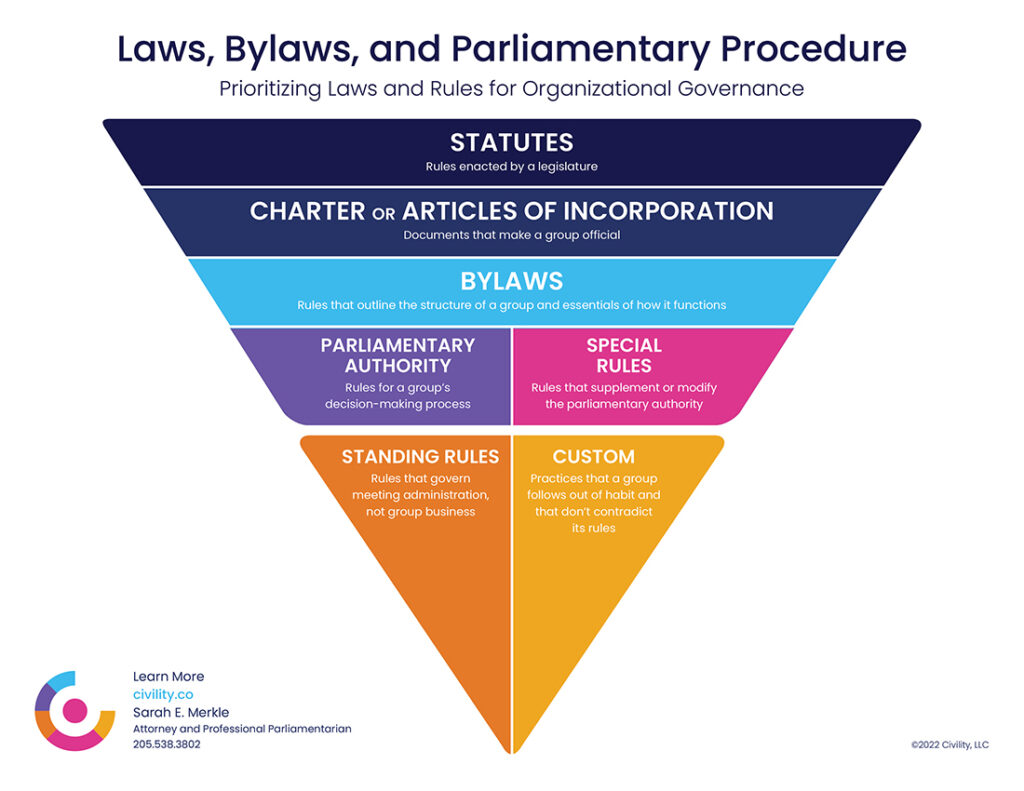There’s something very human about wanting to know the source of a rule. And if you’re doing your best to run your group’s business meetings “by the book,” it helps a lot when you can identify that book—the basis for the actions you’re taking or the way things are being done. In parliamentary procedure we have a name for this reference point: It’s called a “parliamentary authority.”
A Definition of Parliamentary Authority
A parliamentary authority is a set of published rules about parliamentary procedure that a group adopts and follows. It’s a standard that guides all deliberations and official business conducted by an organization, legislative body, or deliberative assembly.
It’s important to note that a parliamentary authority fits within a hierarchy of governing documents that provide the rules for an organization—including the law (state statutes), the group’s charter or articles of incorporation, bylaws, special rules, customs, and standing rules.
So, a parliamentary authority is not the only source of guidelines for how you should conduct your business. But it is an important one. This blog post provides additional guidance on how a parliamentary authority works with the other sets of organizational rules.
The Most Common Parliamentary Authorities
Not every group uses the same rulebook. There’s one favorite—it’s the most common—but there are multiple very good options which you might explore if your group is in the process of selecting one for the first time.
Robert’s Rules of Order, Newly Revised
Robert’s Rules of Order—often abbreviated Robert’s Rules—is the parliamentary authority that most people have heard of. Yes—it is a very traditional, time-honored rulebook (currently in its 12th edition). And it’s the most commonly used source of rules for organizational business.
AIP Standard Code of Parliamentary Procedure
Another parliamentary authority option is the AIP Standard Code of Parliamentary Procedure, formerly known by its author’s last name—Sturgis Standard Code of Parliamentary Procedure. The Standard Code, although less well-known than Robert’s Rules, is used as well by many groups—often because it offers a simpler, more accessible, and sometimes more streamlined approach to parliamentary procedure. The Standard Code also includes a helpful appendix of citations to court cases that reference parliamentary procedure topics.
Identifying Your Group’s Parliamentary Authority
This one is easy: Check your bylaws. Many organizations name a parliamentary authority in their bylaws. To find out which rulebook your group uses, look for a section titled “Parliamentary Authority,” or see if your bylaws say anything like, “The rules contained in the current edition of Robert’s Rules of Order, Newly Revised shall govern Amazing Organization in all cases to which they are applicable and in which they are not inconsistent with these bylaws and any special rules of order Amazing Organization may adopt.”
It’s possible that your group has never selected a parliamentary authority. Just FYI: If you haven’t adopted a parliamentary authority in your bylaws, you cannot force your group to follow one unless the group decides to do so or unless your state law says that Robert’s Rules is the default when bylaws are silent.
And, if you’re that group, and you discover (horrors!) that your organization has not chosen a parliamentary authority—now. is. the. time. A group needs to pick a rulebook. Why? Keep reading….
Reasons for Adopting a Parliamentary Authority
So, why attach your group’s rules to a parliamentary authority? There’s an easy, two-part answer to this: Structure. Efficiency.
Groups benefit immensely from having at least a few rules. And the rules can be adjusted sometimes—read here to learn about how to adopt special rules to make your parliamentary authority work for you. (Extra note: If you follow Robert’s Rules, but want ideas for tweaking that authority, you might find inspiration from the Standard Code.)
But it’s critical to have some rules—if your group wants to get anything done and not take forever.
However, think about it—making up all of your own rules would be time-consuming. So, here’s where a parliamentary authority saves the day: The rules in the above-named rulebooks are ready to go, and no one has to figure out wording or discuss every little possible way things could be done. Rule creativity on every level would be inefficient. The structure of a tried-and-true existent rulebook is very helpful for enabling smooth meetings. (Did I mention helpful?! Save yourself time. Seriously.)
And, don’t be nervous: The rules in a parliamentary authority aren’t anything crazy. They’re actually really simple guidelines for group decision-making. For example, deciding by majority vote. (All in favor, say, “Tacos.” Right?!) Or, limiting discussion. (We all understand the frustration of a mic-hog.) Or, announcing a meeting ahead of time. (You want to make sure everyone’s there for the big vote!) All three of these examples are rules standardized within parliamentary authorities to make life easier for organizations everywhere.
So, there’s nothing truly archaic or terribly complex about making sure your group has a rulebook. It’s actually common courtesy and wisdom to run business meetings smoothly and with order. It makes sure everyone has a voice. And it gives you a go-to when there are questions of procedure.
Where to Learn More


